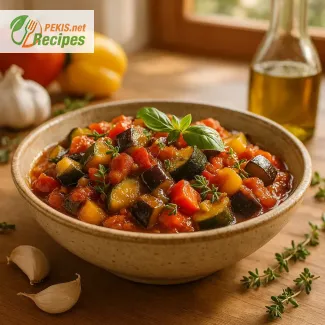Serves 4 portions with a prep time of 20 minutes, cook time of 60 minutes, and a total of 80 minutes. French onion soup with cheesy croutons combines sweet, slow-cooked caramelized onions, rich broth, toasted baguette slices, and bubbling Gruyère cheese for a comforting, golden finish. This classic dish balances rustic depth with elegance, perfect for cozy dinners or festive gatherings. It keeps well for 2 days at room temperature or up to 2 months frozen, and reheats beautifully at 150 °C (300 °F) for 8–10 minutes, making it ideal for preparing ahead.
PEKIS – professional chef and recipe developer with more than 25 years of experience, specialized in European and international cuisine. I’ve prepared countless variations of French onion soup over the years, exploring how the slow caramelization of onions and the right balance of broth, wine, and cheese can turn a simple dish into a rich and memorable comfort food.

A comforting bowl of rich French onion flavors
Layers of sweetness, broth, and golden cheese
A bowl of French onion soup with cheesy croutons delivers more than just warmth on a cold evening; it embodies centuries of culinary tradition and refinement. Slowly caramelized onions provide the soul of this dish, releasing their natural sugars and transforming into a base that is both sweet and savory. Combined with a deeply flavored broth, balanced by a touch of wine, and finished with toasted bread covered in bubbling Gruyère cheese, this soup achieves harmony between rustic simplicity and refined indulgence. The contrast of textures—velvety soup beneath, crisp crouton in the middle, and molten cheese above—creates an experience that feels timeless.
Origins of French onion soup
The history of French onion soup dates back to 18th-century France, where it was considered a humble dish made from plentiful onions and broth. Over time, chefs refined it into what we now know as soupe à l’oignon gratinée, serving it in Parisian bistros as a late-night staple. It became especially popular as a restorative dish after long evenings, gaining a reputation as both comforting and elegant. Today, it remains a global favorite that reflects the artistry of French cuisine while being adaptable to modern kitchens.
Flavor impact of the main elements
- Onions form the base, cooked slowly until caramelized, creating depth and sweetness.
- Butter and oil enrich the texture and allow the onions to soften without burning.
- Broth builds the body of the soup, offering either robust meat notes or a lighter vegetable base.
- Wine or sherry adds brightness, balancing the natural sugars of the onions.
- Crusty bread transforms into a satisfying crouton, soaking in the broth while keeping structure.
- Gruyère cheese melts into a nutty, golden crust that seals the flavors beneath.
Why you will love this recipe
- Rich, caramelized onion flavor with natural sweetness
- Bubbling, golden cheese topping that adds indulgence
- A combination of crispy bread and velvety broth in every bite
- Classic French culinary tradition brought to the home table
- Ideal for both weeknight comfort and festive occasions
Creative variations to explore
- Prepare a vegetarian version using vegetable broth and herbal notes like thyme or rosemary
- Use smoked cheese to add rustic depth
- Add a touch of balsamic vinegar for richer caramel notes
- Rub the bread with garlic before toasting for extra aroma
- Enhance for special occasions with a drizzle of truffle oil or a sprinkle of fresh herbs
Storage and make-ahead tips
- Store at room temperature for up to 2 days, covered
- Freeze in airtight containers for up to 2 months
- Reheat gently at 150 °C (300 °F) for 8–10 minutes, allowing cheese to bubble again
Culinary entities in harmony
The artistry of onion caramelization, the tradition of French broth-making, and the elegance of gratinating cheese unite in this soup. These timeless techniques elevate everyday ingredients into something memorable. As a dish rooted in cultural identity yet adaptable for today’s kitchens, French onion soup with cheesy croutons represents both history and comfort on a plate.
For those who want to try another variation, you can also explore the Traditional French Onion Soup.
Perfect serving occasions
- Starter at formal dinners or celebrations
- A comforting family meal on cold evenings
- Served alongside salads or roasted meats for a balanced menu
- Featured in holiday gatherings where tradition and indulgence meet
- In a large heavy-bottomed pot, melt the butter with olive oil over medium heat. Add the sliced onions and cook slowly, stirring occasionally, until they become deeply golden and caramelized, about 35–40 minutes.
- Sprinkle the flour over the onions and stir well to coat. Cook for 2 minutes to remove the raw flour taste.
- Pour in the white wine, scraping the bottom of the pot to release all caramelized bits, and let it reduce slightly.
- Add the beef broth, bay leaf, and thyme. Season with salt and black pepper. Bring to a simmer and cook gently for 20 minutes, allowing the flavors to meld. Remove the bay leaf and thyme sprigs.
- While the soup simmers, toast the baguette slices until golden.
- Ladle the hot soup into oven-safe bowls, place toasted baguette slices on top, and cover generously with grated Gruyère cheese.
- Place the bowls under a hot oven grill (broiler) until the cheese melts, bubbles, and turns golden brown.
- Serve immediately, with the melted cheese forming a crust over the rich onion soup.
FAQ questionWhat onions work best?
For deep sweetness and balanced savoriness, use yellow onions sliced evenly. Cook them low and slow until caramelized onions turn deep golden (35–45 minutes). Stir occasionally, scrape brown bits from the pan, and keep heat moderate to avoid scorching. A pinch of salt early on helps draw out moisture; a splash of wine or broth to deglaze prevents sticking and builds flavor.
FAQ questionWhich cheese should I use?
Classic choices are Gruyère or Comté for nutty richness that melts into a bubbling cap. Emmental works for a milder profile; a mix of Gruyère + Parmesan adds depth. For broiling, use bowls that tolerate high heat and place them close to the broiler/grill for a golden, blistered finish.
FAQ questionWhat liquid base gives the best flavor?
A robust beef broth creates the most traditional depth; vegetable broth keeps it lighter. Dry white wine (Sauvignon Blanc, Pinot Grigio) or a dry sherry brightens the sweetness of onions. To go alcohol-free, use more broth plus 1–2 tsp apple cider vinegar (or a splash of verjuice) to add gentle acidity without altering the core flavor.
FAQ questionHow do I keep croutons crisp under the cheese?
Toast baguette slices until fully dry and golden, then lightly rub with garlic for aroma. Ladle hot soup into oven-safe bowls, float the toast, and blanket with grated cheese. Broil immediately so the cheese seals the toast into a crisp, cheesy lid instead of letting it soak and soften.
FAQ questionCan I make it vegetarian or gluten-free?
For vegetarian, choose vegetable broth and enhance umami with a dash of soy sauce or mushroom powder. For gluten-free, use gluten-free bread for the croutons and thicken with cornstarch (slurry) instead of flour, or skip thickener and reduce the soup slightly longer.
FAQ questionHow do I store and reheat it?
Cool the soup base quickly and refrigerate (without croutons/cheese) in airtight containers for 3–4 days. Freeze the base up to 2 months. Reheat gently on the stovetop, then assemble bowls with fresh toast and cheese and finish under the broiler. If you prefer oven reheating, 150 °C (300 °F) for 8–10 minutes melts the topping without overcooking.
FAQ questionWhat should I serve with it?
This dish shines as a starter or light main. Pair with a simple green salad, roasted chicken or steak, or a platter of charcuterie. For wine, try Beaujolais, Côtes du Rhône, or an oaked Chardonnay—all complement the sweetness of onions and the richness of cheese.
A steaming bowl of French onion soup brings together rustic tradition and timeless comfort. The combination of caramelized onions, toasted baguette, and golden layers of melted Gruyère captures the essence of French bistro cooking, while remaining easy enough to prepare at home. Every spoonful delivers a balance of sweetness, richness, and warmth that makes it perfect for both everyday dinners and festive occasions.
The appeal lies in its contrasts: soft, velvety broth beneath a crunchy layer of bread and cheese, a humble onion transformed into something elegant through patience and technique. Served in individual ovenproof bowls, it creates a sense of occasion at the table, inviting guests to break through the bubbling crust and savor the flavors underneath.
Flexibility makes this recipe even more inviting. With small adjustments, it can be made vegetarian, gluten-free, or even elevated with truffle oil or smoked cheese for special gatherings. It is a dish that adapts easily while keeping its soul intact.
Whether prepared for family on a cold evening or served as the centerpiece of a dinner with friends, French onion soup with cheesy croutons remains a classic that never loses its charm. It offers more than nourishment—it brings atmosphere, connection, and the taste of tradition shared across generations.
Allergens present in the recipe:
- Gluten (baguette, flour)
- Dairy (butter, Gruyère cheese)
Substitution tips to avoid allergens:
- Replace baguette with gluten-free bread to eliminate gluten.
- Use gluten-free flour instead of wheat flour as a thickener.
- Substitute vegan butter and plant-based cheese for a dairy-free version.
- Vitamin A: 320 µg – supports vision and immune function
- Vitamin C: 14 mg – boosts immune defense and collagen production
- Vitamin B6: 0.4 mg – aids metabolism and brain function
- Calcium: 280 mg – strengthens bones and teeth
- Iron: 2.2 mg – essential for red blood cell production
- Potassium: 430 mg – regulates fluid balance and muscle contractions
- Magnesium: 28 mg – supports nerve and muscle health
- Quercetin: 15 mg – found in onions, reduces inflammation and supports heart health
- Polyphenols: 40 mg – protect cells from oxidative stress
- Selenium: 8 µg – supports immune function and antioxidant defense





